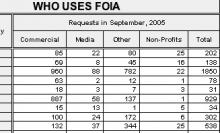FOIA responses - better use of time?

An item out of Sauk Village, Ill., caught my eye this morning. In it, the village clerk complains to NWI.com that the village has been inundated with FOIA requests -- more than 100 this year and 18 on Aug. 27 -- and there’s no “rhyme or reason” to this.
“They’re making a sham of the FOIA system,” she says, noting that by “they” she means “jaded former village officials” and, apparently, a group called Sauk Village Citizens for Public Awareness, both of whom are politically motivated, which have asked for lists of salary and benefits for all village employees, road repairs for the past two years, the location and list of all inoperable fire hydrants and copies of the year-to-date general ledger.
The village president has a solution: publish a web page listing the names of all FOIA requesters, as well as the cost and time spent by attorneys and staff on each request.
(Here’s a link to the village website, which includes an email address on the home page indicating where FOIA requests can be sent. Good for them!)
Now, I’ve got no beef with publishing the name of FOIA requesters. FOIA requests are public records. When I conduct FOIA training sessions for government employees, I even recommend creating such a page or internal file as a way to better manage FOIA requests. For instance, if someone has already asked for certain records in the past, why prepare them again if they can just be pulled down from an online file?
What I do have a beef with is a local government complaining on the one hand that the requests are taking staff away from “what they need to be doing,” and on the other hand suggesting that they will take 35 to 40 days to create a website identifying FOIA requesters.
For starters, why will it take 35 to 40 days when -- if they are following best practices -- they should have this information at their fingertips in a FOIA-response management file. There is a “physical log” available at the village hall. Why isn’t there already an electronic log, too?
Furthermore, why in the world would they not have enough time to fill the FOIA requests but have enough time to create this kind of page? Is that what they “need to be doing” that they haven’t been able to?
If efficiency was the motivating factor behind the new page’s creation, I might be a little less harsh. But in the story -- as reported, at least -- there’s no indication that that IS the reason. Instead, the implication is that the page is being created as retaliation for past requests and/or as a deterrent to future requests: Ask us too many times and we’ll put you up to the angry wrath of the public who won’t like you wasting village resources.
My advice to the village is to go ahead and create an electronic log of FOIA requests from this day forward. Be consistent and be neutral. Make it available to the public if you want to. Just don’t use the page as a means of retaliating against the public for exercising a statutorily granted right. And remember: the same angry public may not like what they see when they look at how the FOIA requests are being responded to.
--mhr
*Virginia law has provisions to deal with the vexatious FOIA requester: government can petition a judge for more time to respond, allowing for the collection of fees, allowing requests not to be filled if bills aren’t current and, as always, allowing government and requesters to work together to produce documents in a mutually agreeable manner.


Add new comment